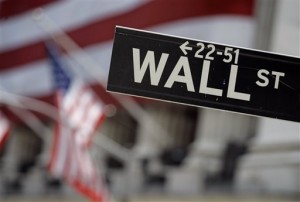
This May 11, 2007 file photo shows a Wall Street sign in front of the flag-draped facade of the New York Stock Exchange. U.S. stocks are edging higher Thursday, April 2, 2015, as the market shakes off two days of losses. AP
US government bond prices rose and the dollar fell after US employers added the fewest jobs since December 2013.
Investors saw the weaker-than-expected job gains as a sign that the Federal Reserve was less likely to raise interest rates soon.
The rise in bond prices pushed down the yield on the 10-year Treasury to its lowest level in two months and the dollar fell 1 percent against a basket of other currencies. Stock futures also declined.
US stock markets are closed in observance of Good Friday, but there is limited morning trading in other markets. The U.S. bond market wraps up at 12 p.m. Eastern time. Major European markets are closed. Asian stock markets finished mostly higher.
KEEPING SCORE: The yield on the 10-year Treasury note fell to 1.81 percent as of 9:30 a.m. Eastern time Friday. That was down from 1.91 percent late Thursday. Standard & Poor’s 500 index futures fell 20 points after being up slightly ahead of the job news.
Tokyo’s Nikkei 225 gained 0.6 percent and Seoul’s Kospi rose 0.8 percent. The Shanghai Composite added 1 percent and Thailand’s benchmark was down 0.1 percent. Markets were closed for holidays in Germany, France, Britain, Hong Kong, India, Australia and in several Southeast Asian countries.
U.S. JOBS: U.S. employers added the fewest jobs since December 2013 — just 126,000 — in March. The smaller-than-expected increase ended 12 straight months of gains above 200,000. The unemployment rate remained at 5.5 percent, according to the Labor Department.
Economic growth has been hampered this year by harsh winter weather, slowdowns at factories and lackluster construction activity.
The government also revised down its estimate of job gains in February and January by a combined 69,000.
THE QUOTE: “A poor jobs report … is not a surprise given the weak economic data … we’ve seen of late,” said Dan Greenhaus, chief strategist at BTIG, a financial services firm. He added that the odds of the Fed raising rates in June or September appeared lower.